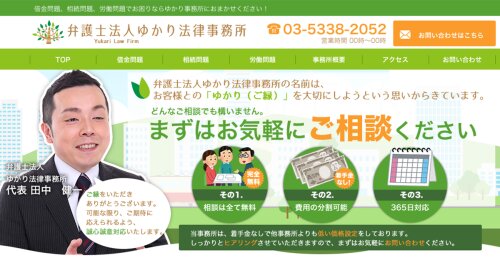Best Bankruptcy Lawyers in Tokyo
Share your needs with us, get contacted by law firms.
Free. Takes 2 min.
List of the best lawyers in Tokyo, Japan
About Bankruptcy Law in Tokyo, Japan
Bankruptcy in Tokyo, Japan, is governed by a comprehensive legal framework designed to provide relief to individuals and businesses facing insurmountable debt. The law aims to offer a fresh start by liquidating assets to repay creditors or restructuring debts to enable easier repayment terms. Japan's Bankruptcy Act primarily oversees these processes, alongside the Civil Rehabilitation Act and the Corporate Reorganization Act, catering to different bankruptcy scenarios and debtor types.
Why You May Need a Lawyer
Navigating bankruptcy can be complex, and having a lawyer helps in many ways. Common situations requiring legal help include financial distress due to excessive debt, dealing with aggressive creditors, needing guidance on choosing the right type of bankruptcy filing, understanding the obligations and rights during the bankruptcy process, and ensuring compliance with all legal procedures to avoid any rejections or penalties. A skilled lawyer can also negotiate with creditors to potentially reduce debts or reach settlements.
Local Laws Overview
In Tokyo, the Bankruptcy Act provides a legal mechanism for individuals and businesses to either eliminate or reorganize their debts. The law offers various types of bankruptcy, such as:
- Personal Bankruptcy (Kojin Hasan): Intended for individuals, this process wipes out most unsecured debts after liquidating non-exempt assets.
- Special Liquidation (Tokubetsu Seisan): A process for businesses allowing for a quick settlement, typically outside of court.
- Corporate Reorganization: Allows businesses to continue operations while repaying creditors under a court-approved plan.
- Civil Rehabilitation: Designed for debt restructuring, offering businesses and certain individuals an opportunity to negotiate debt reduction while maintaining control over their assets.
Tokyo's legal environment provides distinct routes for individuals and corporations, aiming to balance creditor repayment with the economic rehabilitation of debtors.
Frequently Asked Questions
What are the types of bankruptcy available in Japan?
The main types include Personal Bankruptcy (Kojin Hasan), Corporate Reorganization, Civil Rehabilitation, and Special Liquidation, each serving different debtor needs.
How long does the bankruptcy process take?
The duration varies; personal bankruptcy might take several months, while corporate reorganization can take several years depending on the complexity.
Can all debts be eliminated through bankruptcy?
No, certain debts such as taxes, fines, and liabilities arising from illegal acts might not be discharged.
Will I lose all my assets if I file for bankruptcy?
Not necessarily. Some assets are exempt from liquidation, allowing you to retain necessary personal belongings.
Does filing for bankruptcy affect my employment?
While bankruptcy is a personal financial issue, it might indirectly affect employment, especially in financial sectors or jobs requiring fiduciary duties.
Can a foreigner file for bankruptcy in Tokyo?
Yes, as long as they meet certain residency or business operation conditions within Japan.
How does bankruptcy affect my credit score?
Bankruptcy significantly impacts credit scores negatively, making it harder to secure loans for several years after filing.
Do I need to inform my employer about my bankruptcy?
You are not required to inform your employer, but it's advised if your financial status affects your work responsibilities.
Can I choose which type of bankruptcy to file?
Yes, but it requires understanding your financial situation and legal guidance to decide the most suitable option.
What is the role of a trustee in bankruptcy proceedings?
A trustee manages the bankruptcy process, including conducting evaluations, liquidating assets, and distributing funds to creditors.
Additional Resources
Several resources are available for those in need of bankruptcy advice in Tokyo:
- Tokyo Bar Association: Offers referrals and guidance on finding qualified bankruptcy lawyers.
- Legal Support Center (Houterasu): Provides legal information and support for public access to legal advice.
- Japanese Ministry of Justice: Offers information on bankruptcy laws and procedures.
- Consumer Affairs Agency: Provides advice and resources on financial management and consumer rights.
Next Steps
If you need legal assistance with bankruptcy in Tokyo, consider these steps:
- Assess your financial situation to determine the need for bankruptcy.
- Consult with a bankruptcy lawyer for personalized legal advice.
- Gather all financial documents, including debt records and asset lists, to prepare for consultations.
- Decide on the type of bankruptcy best suited for your circumstances, with your lawyer's help.
- Ensure timely filings and adhere to all court protocols to maximize your chances of success.
Engaging with a professional will ensure compliance with local laws and help you navigate the complexities of the bankruptcy process effectively.
Lawzana helps you find the best lawyers and law firms in Tokyo through a curated and pre-screened list of qualified legal professionals. Our platform offers rankings and detailed profiles of attorneys and law firms, allowing you to compare based on practice areas, including Bankruptcy, experience, and client feedback.
Each profile includes a description of the firm's areas of practice, client reviews, team members and partners, year of establishment, spoken languages, office locations, contact information, social media presence, and any published articles or resources. Most firms on our platform speak English and are experienced in both local and international legal matters.
Get a quote from top-rated law firms in Tokyo, Japan — quickly, securely, and without unnecessary hassle.
Disclaimer:
The information provided on this page is for general informational purposes only and does not constitute legal advice. While we strive to ensure the accuracy and relevance of the content, legal information may change over time, and interpretations of the law can vary. You should always consult with a qualified legal professional for advice specific to your situation.
We disclaim all liability for actions taken or not taken based on the content of this page. If you believe any information is incorrect or outdated, please contact us, and we will review and update it where appropriate.















